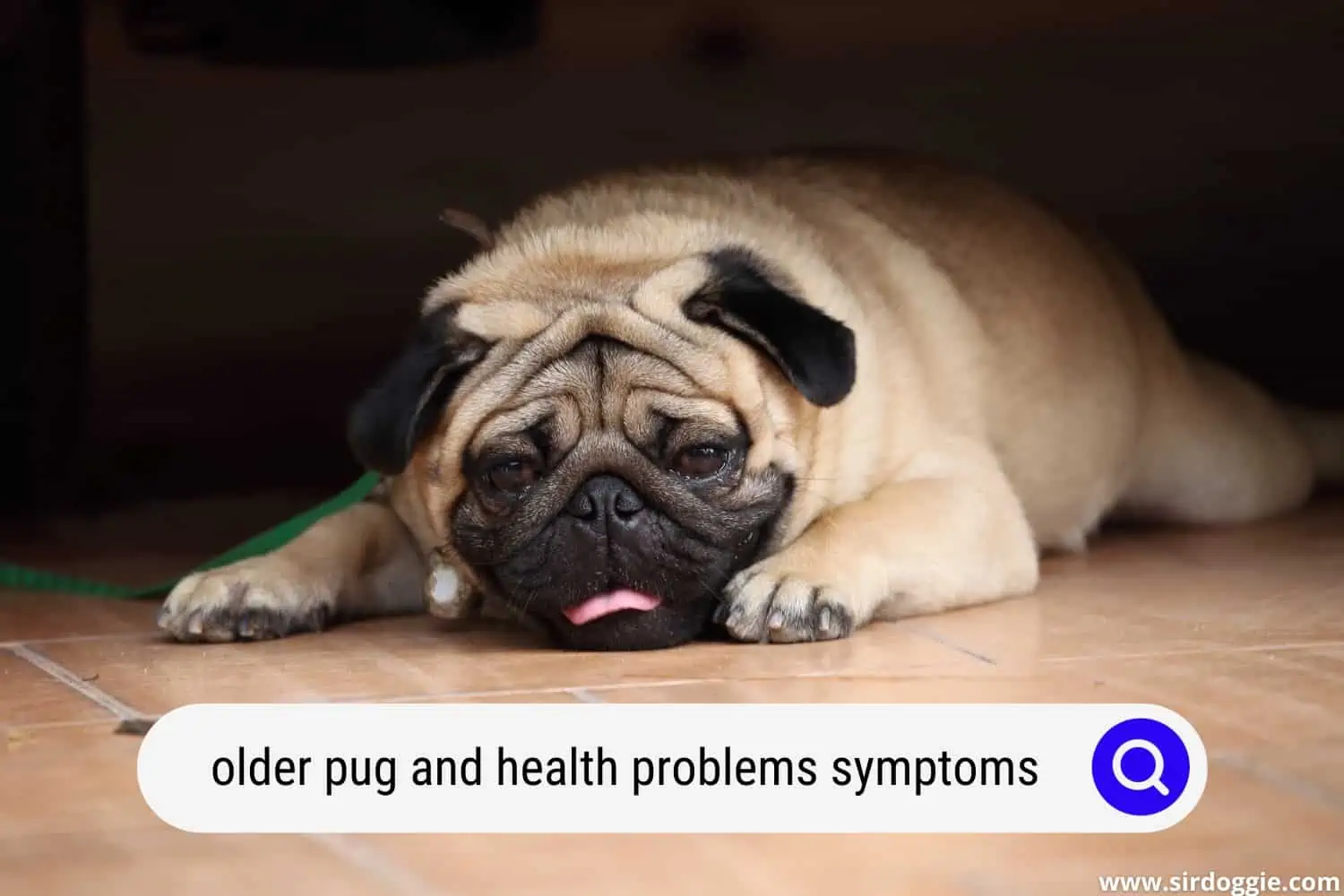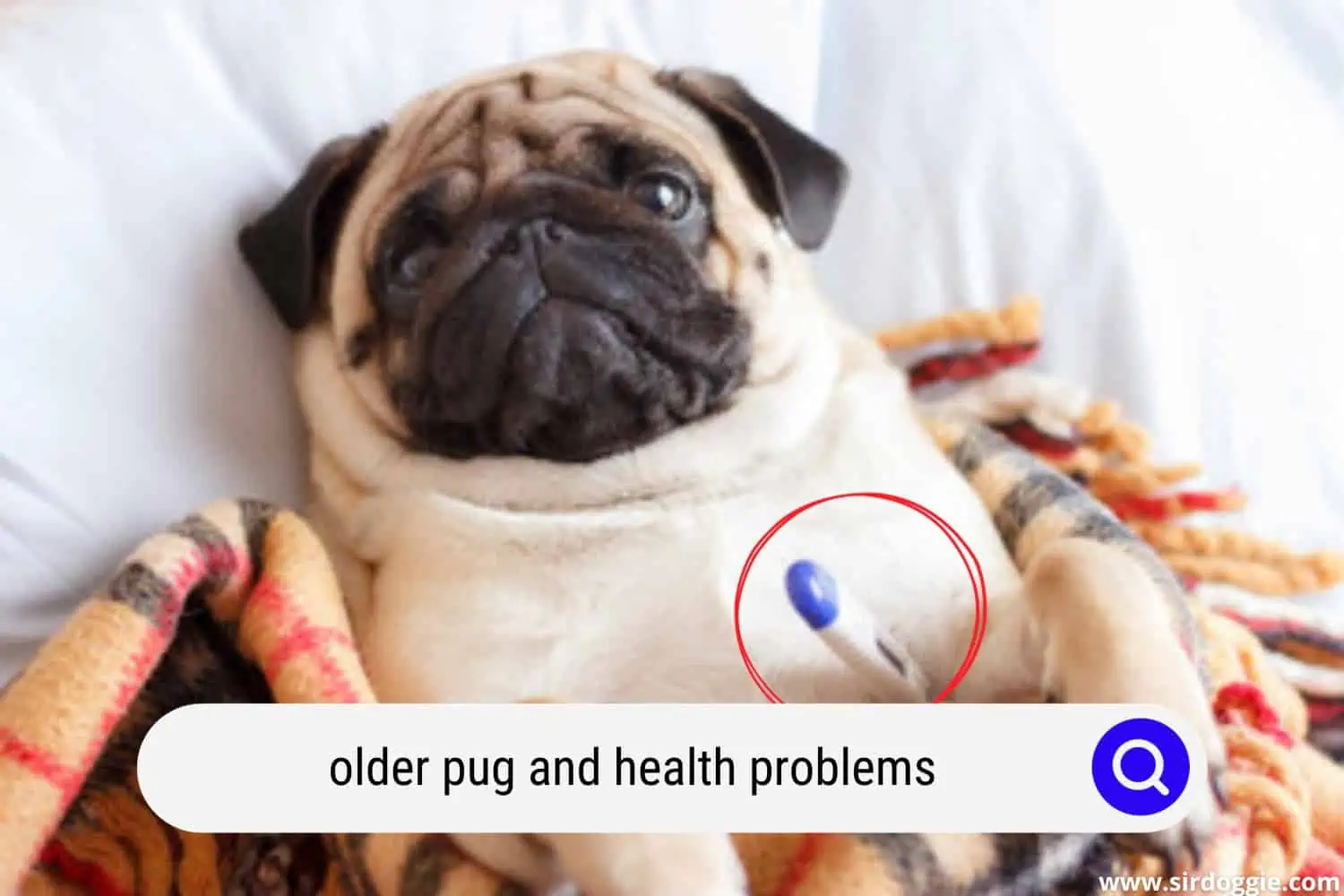Older Pug and Health Problems’ Symptoms: How Senior Pugs Are Affected By The “Golden Age”.
Every dog owner hates it when his/her pooch is getting into its “golden age stage.” It is sad to see how their health deteriorates. They are not as active anymore and are limited in a lot of things they used to do easily when they were younger.
Getting old is especially difficult for breeds who are prone to various ailments from the start. For example, Pugs. This breed is known for having breathing, heart, and joint issues, as they are considered brachycephalic, or flat-faced.
They are born with this condition and sometimes only surgery can help open air pathways for normal oxygen flow. So, if it’s bad when a Pug pup is still young and full of energy, can you imagine how it might feel for a senior Pug? Let’s talk about an older Pug and the health problems and symptoms you may notice as it ages.

A Pug’s Medical Problems
Here are some of the most common medical problems an old Pug dog is prone to getting as it ages.
A Pug owner may be wondering what signs in his/her older Pug and health problems’ symptoms surfacing might require a doctor’s immediate attention.
Related Reading: Pug Myelopathy: When To Euthanize?
Older Pug and Health Problems’ Symptoms
If you notice any of the following symptoms, schedule a vet appointment without delay.
- Wheezing, Coughing, or Choking: these could be indicators of a serious illness like Bordatella, Distemper, or a developing heart condition. Bring your flat-faced pooch to the vet for a check-up and he/she will be able to determine exactly what this might be. Yearly vaccinations might be a great preventative measure to avoid the mentioned health issues.
- Wall-bumping, Disorientation, Eye-scratching: it could either be a simple eye infection like conjunctivitis or something more serious like cataracts. If the latter, a Pug pooch has to be given treatment right away to avoid potential vision loss.
- Limping, Paw-Licking: a potential injury or even a broken bone. If you see that your Pug pal is leaning on one side or cannot even step on one of its paws and whining non-stop, it is an alarming sign. There might be x-rays that need to be performed to find out the exact reason for the limping behavior. Sometimes a wobbly walk can be an indicator of arthritis, a very common senior Pug condition. As a pooch ages, its bones and joints slowly become worn out. It is very similar in symptoms to two-legged arthritis. After all, we are all animals, no matter if two- or four-legged.
- Excessive Body Scratching, or Rubbing: those are usually allergic symptoms, either pollen, dust mites, parasite infestation, or a reaction to a certain type of food. The first logical thing to do is to inspect your pal for any clear, visual signs of what might be causing the discomfort. If you see ticks, fleas, or mites, just buy a special tick-eliminating shampoo and give your wrinkle-faced pal a nice bath. Try to use some preventative treatments like Seresto or Frontline to nib the parasite problem in the bud.

Curl-Up
Getting old is just a routine part of life. While it is not fun for humans, it is certainly not fun for their canine companions. They start getting various ailments like joint issues, heart diseases, seizures, and many other disorders. An older Pug and health problems symptoms always go hand-in-hand, but a few things can be done to make its life healthier and extend its lifespan.
These include preventative measures like vaccinations, pest-eliminating medications, and of course, yearly vet visits. It is crucial to closely monitor your mutt for any troublesome signs like the ones we’ve talked about in this article.
Related Reading: Why Are My Pug’s Teeth Falling Out?!

Family Dog Expert Author
Hi there! I’m Stuart, a devoted dog lover and family dog expert with over a decade of experience working with our furry companions. My passion for dogs drives me to share my knowledge and expertise, helping families build strong, loving bonds with their four-legged friends. When I’m not writing for SirDoggie, you’ll find me hiking, playing with my beautiful dog, or studying music.
